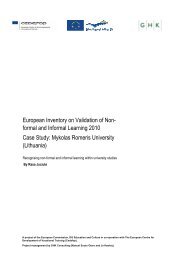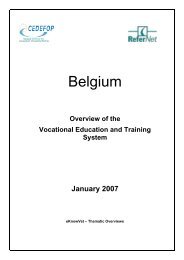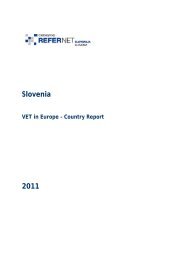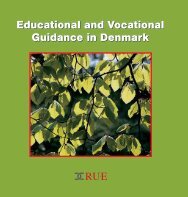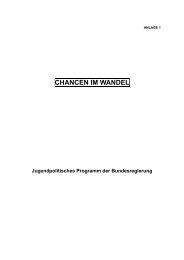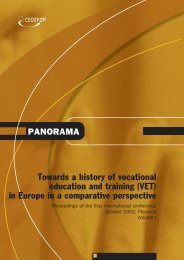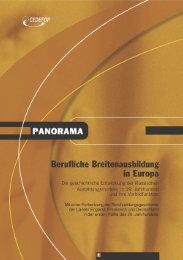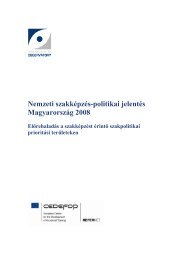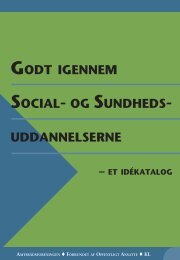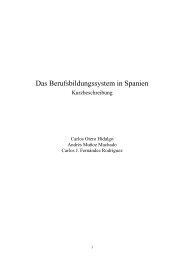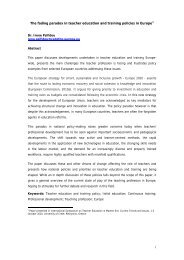PROFF – Professionalisation of VET teachers for the future - Europa
PROFF – Professionalisation of VET teachers for the future - Europa
PROFF – Professionalisation of VET teachers for the future - Europa
Create successful ePaper yourself
Turn your PDF publications into a flip-book with our unique Google optimized e-Paper software.
On pedagogical skills <strong>the</strong>re are some clear transnational trends. In many training activities,focus is on qualifying <strong>teachers</strong> <strong>for</strong> more ‘student-oriented’ approaches, i.e. coaching; guiding;supervising and tutoring.There is a clear change in <strong>the</strong> teacher’s role brought about by a stronger focus on learning, <strong>the</strong>students and <strong>the</strong>ir individual learning styles, and by <strong>the</strong> greater flexibility <strong>of</strong> <strong>VET</strong> broughtabout by modularisation and increased possibilities <strong>of</strong> credit transfer/recognition <strong>of</strong> priorlearning. This calls <strong>for</strong> more individual guidance <strong>of</strong> students and <strong>the</strong> ability <strong>of</strong> <strong>teachers</strong> toassess <strong>the</strong> strengths and weaknesses <strong>of</strong> <strong>the</strong>ir students to guide <strong>the</strong>m through <strong>VET</strong>.Ano<strong>the</strong>r skill focus is ability to cooperate with o<strong>the</strong>r <strong>teachers</strong> in planning and carrying out <strong>the</strong>teaching. Teachers are expected to cooperate and create synergy between different subjects in<strong>the</strong>matic/interdisciplinary teaching.One case that stands out is <strong>the</strong> Portuguese one focusing on ‘pedagogy <strong>of</strong> documentation’. Theaim <strong>of</strong> this training activity is to qualify <strong>teachers</strong> to work as ‘in<strong>for</strong>mation guides’ in schoollibraries. It provides a good example <strong>of</strong> <strong>the</strong> expanding functions <strong>teachers</strong> are expected toundertake. Teachers learn about documentation methods and in<strong>for</strong>mation search to guidestudents in <strong>the</strong>ir search <strong>for</strong> in<strong>for</strong>mation.However, training does not focus solely on <strong>the</strong> pedagogical update. Teacher functions are notisolated but seen as a whole and <strong>the</strong>re<strong>for</strong>e training also provides participants with skills thatsupport <strong>teachers</strong> in o<strong>the</strong>r functions, e.g. project work and management, administration andresearch-related activities.Overall, <strong>the</strong> cases confirm a move away from an isolated teacher role to teacher teams andmore diverse teacher functions. Teachers must have a very broad span <strong>of</strong> skills to per<strong>for</strong>m in<strong>the</strong>ir pr<strong>of</strong>ession.The cases represent innovative training activities and thus a common ambition is to developnew and more up-to-date models <strong>for</strong> <strong>the</strong> continuing training <strong>of</strong> vocational <strong>teachers</strong>. Sometransnational trends are use <strong>of</strong> dual training, modularisation, on-<strong>the</strong>-job learning and studycircles/experience exchange groups.These methods are not new, but it is obvious lifelong learning, focus on different learningcontexts, interaction between <strong>the</strong>se learning contexts, and teamwork have had a hugeinfluence on <strong>the</strong> way training and skills development are perceived. The interaction betweenpractice and <strong>the</strong>ory is increasingly in focus. The challenge is to create training activities whichare close to <strong>the</strong> practice <strong>of</strong> <strong>teachers</strong> and which support <strong>the</strong>m in <strong>the</strong>ir present <strong>–</strong> and <strong>future</strong> <strong>–</strong>functions but which also challenge <strong>the</strong>ir practice. Often <strong>teachers</strong> have to reflect on practiceand see how <strong>the</strong>ory and practice might ‘fertilise’ each o<strong>the</strong>r.In <strong>the</strong> Dutch case, a good example <strong>of</strong> new approaches to training is provided. The trainingactivities are tailor-made to <strong>the</strong> institutes <strong>of</strong> vocational training and adult education (ROCs)and reflect different contextual factors: a new labour market agreement, fear <strong>of</strong> a large exodus21



